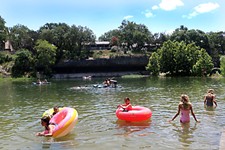Day Trips
By Gerald E. McLeod, Fri., Aug. 20, 1999
|
Historic Review Board members Elaine Lockhart, |
Born August 27, 1908, on a ranch west of town, Lyndon Johnson always considered the Hill Country his home. On the 91st anniversary of his birthday, a wreath-laying ceremony will be held at 10am at the LBJ Ranch near Stonewall with featured speaker Jack Valenti. Refreshments will be served afterward and free bus tours of the ranch will run all day.
The next day, Saturday, August 28, the festivities begin at 1pm at the Lyndon B. Johnson National Historical Park Visitor Center in Johnson City. Tours of Johnson's boyhood home and the Johnson Settlement will be given throughout the day with special docents telling stories about the Johnson family and life on the Texas frontier.
Coinciding with the events at the park, the Johnson City Historic Review Board (HRB) will offer a 10am tour around the Johnson City Historical District. The tour will begin at the visitor center, two blocks south of US290. During the afternoon, 2:30-4pm, at the Pedernales Electric Cooperative auditorium, 201 S. Ave. F, local citizens will reminisce about growing up in the shadow of a president. Many will bring personal artifacts and memorabilia. It really gets interesting when the locals start telling stories that remind their neighbors of a story they might not have thought of in years, says Elaine Lockhart, HRB member.
"The aim of the birthday celebration is to recognize LBJ's contribution to the city and the nation," says HRB member Bill Arbon, "and to remind the city of its history and place in national history."
"Not only did he affect the city," says the third HRB member, Steve Handzo, whose wife is a ranger at the LBJ National Park, "but the city affected him, too, in very visible ways."
Throughout his political career, Lyndon Johnson remembered the hard times and poverty of growing up in rural America. In the sun-baked rocky soil of the Hill Country, he saw his own family work from dawn to dark only to lose their land in an economic downturn. In less than one generation the family went from prominence to poverty.
LBJ's contribution to the nation included the Civil Rights Act of 1964, which outlawed racial discrimination in public accommodations, and the Voting Rights Act of 1965, which ensured the right of vote for all. Locally, Johnson brought recognition to the Hill Country that continues to attract visitors. He also brought electricity to the farmers with the Pedernales Electric Cooperative (PEC) beginning in 1939. Today, the National Park Service and PEC are the largest employers in the area.
One of the amazing aspects of Johnson City is how little it has changed over the years. It is a time capsule of small-town America.Two significant economic boom periods, the 1930s and 1960s, saw the greatest increases in the number of buildings around the Blanco County Courthouse (built in 1916). "What we're trying to do is preserve the town in a way that LBJ would recognize it," Arbon says. "[LBJ] would recognize many places now because they were here when he was [here], and in similar condition [to when he was here]."
"The lack of economic interest [in the commercial district] has kind of sealed them up in their own little bubble here. As a historical district, we want to maintain that," says Lockhart.
The town's main business district, a block of Nugent Street north of US290, is filled with antique dealers and junk shops. The old mill that the nephew of Lyndon's grandfather, James Polk Johnson, started in 1880 was turned into a shopping mall in 1994. Even it failed to slow the traffic of tourists whizzing by on their way to Fredericksburg.
Many of the historically significant buildings in the district remain virtually unaltered. At Seventh and Nugent is the Johnson City Bank, which looks much as it did when constructed in 1885. The two-story limestone building served as the county courthouse from 1891 until 1916. A variety of businesses have been housed in the building including LBJ's office.
Catty-corner to the bank building is the old Pearl Hotel also built by James Polk Johnson. The two-story hotel with a double porch is typical of frontier-style inns. It was the town hall until the 1980s and now stands vacant.
James Polk was really the town's founder and chief promoter. LBJ's grandfather, Sam Ealy Sr., and great-uncle Tom Johnson raised cattle in the area and had a series of cattle pens where the town is now. The brothers collected cows and drove them to Abilene, Kansas. The Johnsons had a few great years of buying and selling cattle, but lost their collective shirts when the bottom dropped out of the beef market. They sold out to nephew James Polk, who worked the land and laid out the town.
The Blanco County Jail across the street from the courthouse at Seventh and Ave. G is one of the oldest county jails in the state. A complete guide to these and other hsitoric buildings is available at the LBJ National Park Visitor Center.
For a real feel for the frontier, visit the Johnson Settlement next to the visitor center in Johnson City or the Sauer-Beckman farmstead at the LBJ State Historical Park outside of Stonewall. For information on the national park, call 830/868-7128 x244. For Johnson City informaton, call the chamber of commerce at 830/868-7684.
Coming up this weekend ...
The Old Lumber Yard in Johnson City has been turned into a collection of merchants featuring old and new home furnishings, accents, and gifts. Every Saturday night Bobby Mack hosts a Texas Music Revue. Tish Hinojosa joins the revue Aug. 21. Bring chairs or blankets for music under the stars, 6-10pm. 830/868-2381.
428th in a Series. Collect them all.









